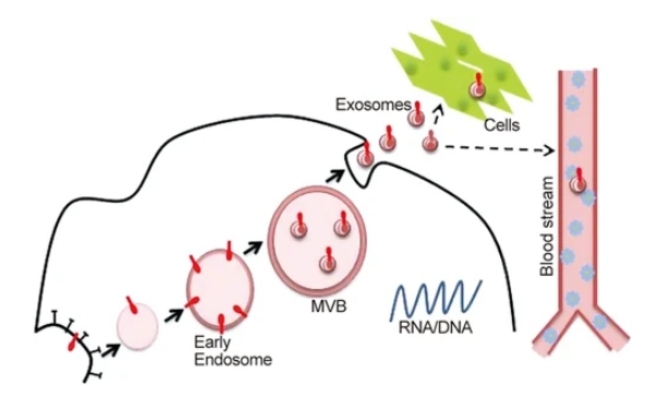Exosome in Disease Areas
Online InquiryExosomes, as one of the naturally secreted extracellular vesicles (EVs), possess inherent high stability, biocompatibility, low immunogenicity, and targeted delivery, and play an important role in intercellular communication, and therefore have attracted much attention in the field of nanomedicine in recent years. Exosomes contain various bioactive materials, such as proteins, RNAs, and other components. They are involved in a variety of physiopathological processes including biological development, epigenetic regulation, immune regulation, and tumorigenesis and progression. Exosomes have emerged as an important tool in the diagnosis and treatment of various diseases.
 Fig. 1 Biogenesis and release of extracellular vesicles: represented diagram depicts a typical extracellular vesicle biogenesis and release. (Samanta, Saheli, et al., 2018)
Fig. 1 Biogenesis and release of extracellular vesicles: represented diagram depicts a typical extracellular vesicle biogenesis and release. (Samanta, Saheli, et al., 2018)
Creative Proteomics is committed to being a service provider that continuously improves, innovates, and supports world-class customers. We provide a range of customized and reliable services and solutions, including exosome isolation and purification, exosome engineering, exosome identification, exosome proteomics analysis, exosome metabolomics analysis and so on. For many years, based on knowledge and experience in exosome research and analysis, we have been offering sustainable innovative services and solutions at low maintenance costs. We are proud to offer the following disease exosome research solutions to our clients worldwide, including but not limited to:
1. Cancer exosome research solution
Cancer-derived exosomes affect not only the invasive potential of proximal cells, but also distal tissues. Based on their ability to participate in cell-cell communication, regulate tumor growth, and alter tumor microenvironment, there has been growing interest in their research and application in cancer. Exosomes not only provide a new way to detect cancer biomarkers, but may also have great potential in cancer therapy. They can serve as carriers for anticancer drug delivery and offer potential targets for cancer therapeutic interventions.
2. Neurological disease exosome research solution
Studies have shown that exosomes from the central nervous system can be found in cerebrospinal fluid and peripheral body fluids and that their levels vary with the disease state. Since they contain a variety of bioactive materials, exosomes are considered a snapshot of the intracellular environment. Moreover, exosomes are highly stable in the peripheral circulation and can penetrate the blood-brain barrier (BBB). Therefore, exosomes may be an attractive prospect in central nervous system diseases because they can be utilized as biomarkers to monitor disease development, and enable early diagnosis, as well as therapeutic tools for optimizing treatment.
3. Cardiovascular disease exosome research solution
The progression of cardiovascular disease includes a series of underlying pathological changes, including cardiomyocyte apoptosis and hypertrophic growth, inflammation, cardiac fibrosis, and angiogenesis. Exosomes play a critical role in cellular communication as well as regulate downstream signal pathways associated with cardiovascular disease progression by delivering signal molecules. In addition, the exosomes released from progenitor cells are biologically active and are key mediators for cardiovascular disease stem cell therapy, a potential alternative to stem cell therapy.
4. Tissue regeneration and repair exosome research solution
In recent years, exosomes have attracted extensive attention and research in tissue regeneration and repair. They have been studied and used to effectively promote the repair of tissue or organ defects, including the liver, heart, and kidneys. Exosomes could modulate a series of processes, such as renal glycerol reperfusion, cardiovascular disease ischemia, or hepatic fibrosis through the delivery of nucleic RNAs, thus promoting the reconstruction and functional recovery of these organs. In addition, they have also been reported to play an important role in the repair activities associated with bone and cartilage through their actions on chondrocytes, osteoblasts, osteoclasts, precursor cells, and immune cells.
5. Infectious disease exosome research solution
Exosomes have a dual role during the process of infection. On one hand, these vesicles can deliver pathogen-associated molecules that facilitate the continuation and enhancement of infection processes, and on the other hand, they can protect the host by activating the immune response and reducing pathogen transmission. In both cases, exosomes enable a possible link between host cells or between pathogens and host cells.
6. Kidney disease exosome research solution
Exosomes have been widely studied in many acute and chronic kidney diseases, including acute kidney injury (AKI), lupus nephritis (LN), diabetic nephropathy (DN), and renal fibrosis and chronic kidney disease (CKD). Furthermore, researchers have found the emerging role of exosomes in kidney stone disease. These vesicles have been utilized as potential pathogenic molecules, valuable non-invasion biomarkers, and therapeutic biologics for these kidney diseases/disorders.
If you are interested in our services, or specific experience, or would like to receive professional advice in the areas we cover, please contact us or directly send us an inquiry. Our experts in your field of interest will get back to you shortly.
Reference
- Samanta, Saheli, et al. "Exosomes: new molecular targets of diseases." Acta Pharmacologica Sinica 39.4 (2018): 501-513.
* For Research Use Only. Not for use in diagnostic procedures.



